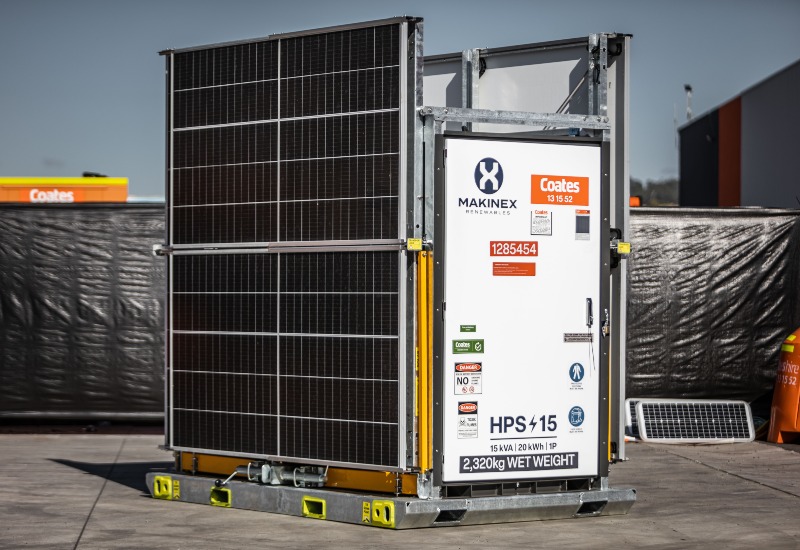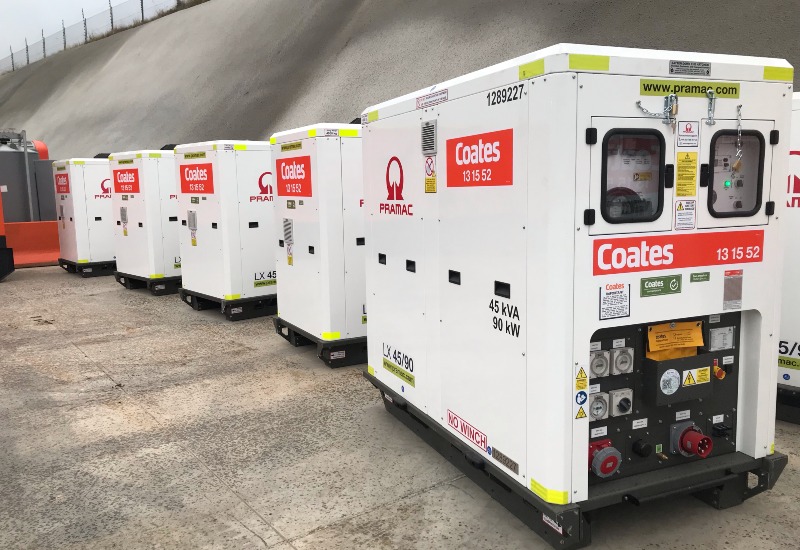Equipment for Hire
Equipment for Hire
Engineering Solutions
Engineering Solutions
Industrial Solutions
Industrial Solutions
Power & HVAC
Power & HVAC
Is battery or hybrid power right for your site?
Find out if alternative power can improve the cost, efficiency and environmental performance of your next project
Diesel and petrol-powered generators have traditionally been used on construction and industrial sites with limited or no access to power. But growing environmental challenges and demand for more cost-effective energy solutions are driving innovation for alternative power solutions.
Hybrid power refers to any electrical system that generates or stores energy from more than one source. This can include grid-connected solar and various off-grid hardware configurations. Batteries are central to off-grid systems and can be combined with renewables like solar while still offering the reliability of diesel.
“At Coates we have a growing range of hybrid power products, including skid mounted diesel battery, integrated solar, and fully modular battery systems, which form the backbone of our bespoke hybrid power systems,” says Kurt Edwards, Coates Power & HVAC Manager. “These products can greatly reduce operating costs, improve power reliability and provide excellent environmental outcomes.”

Hybrid power systems combine battery, solar and a diesel generator to produce cleaner and more sustainable energy
For example, Coates recently supplied a hybrid power solution to support BMD in delivering a section of the Mickleham Road Upgrade in Victoria. Instead of operating a diesel generator 24 hours a day, the generator on BMD’s hybrid power system averaged less than one minute each day during the 7-week hire period – reducing BMD’s carbon footprint by 3,653 kilograms of carbon dioxide and delivering fuel cost savings of 98.5%1.
Battery vs. hybrid power systems
Hybrid solar and battery-powered systems
By combining solar and battery technology with an integrated backup diesel generator, hybrid power systems like the Makinex HPS15 help customers to capture, store and produce cleaner and more sustainable energy. To power larger sites, the three-phase HPS45 steps up power production, bringing double the solar and battery capacity and three times the generator capacity of the HPS15. .
Globe Power’s Hybrid AC (HAC) uses a battery to store and deploy energy produced by a diesel generator. For greater flexibility, it can also be configured to receive an external solar energy supply. HACs really shine when the sun doesn’t, with the ability to provide silent overnight operation from battery storage.
Battery Energy Storage Systems (BESS)
With 5 or 6 times the energy storage capacity of the HPS15 or HAC unit, Coates’ BESS 45/90 provides a silent, reliable and continuous source of power for sites with higher power requirements. Dual power inputs can accommodate power from external sources, most commonly a diesel generator and solar. BESS units can also supply additional power if the site grid-connected power supply is insufficient.

Battery energy storage systems provide silent, reliable and continuous power for sites with higher power requirements
Benefits of hybrid power
Less greenhouse gas (GHG) emissions
By reducing fuel consumption, hybrid power produces significantly lower CO2 emissions than traditional generators. Every 369L of diesel saved is another tonne of Scope 1 GHG emissions2 not emitted to the environment from your project.
Less pollutant emissions and noise
When a hybrid system is running on the battery there is no impact on the occupational environment – meaning less noise and less diesel particulate matter.
Cost savings
HPS and BESS can reduce the cost of temporary power considerably. In most cases, higher equipment rental costs are easily offset by the lower diesel burn - resulting in lower operating costs and savings for customers.
Managing variable loads
Hybrid power manages variable loads more efficiently, especially low loads. Most generators struggle to operate efficiently at low loads (anything below 25% of their rated capacity), whereas batteries can handle both low loads and sudden spikes in demand.
This means generators in hybrid systems can be sized more conservatively on base load, rather than theoretical peaks, and operate at optimal efficiency.
Increased safety
The lower fuel requirement of hybrid power reduces refuelling and maintenance traffic on site. Lower fuel burns also mean reduced fuel storage quantities, reducing safety risks.
Reduced downtime
Standard generators need to be serviced every 500 hours of operation, so a machine running 24/7 needs servicing every three weeks. In hybrid systems, generators only run when necessary, resulting in reduced runtime and less wear and tear.
Choosing the right type of power for your site
There is generally a hybrid power solution to suit any site – you just need to choose the right system and configure it the right way. Things to consider include:
Your objectives
Be clear and communicate your objectives. If you want to reduce operational diesel costs, then a simple diesel battery hybrid may provide the best result. Looking to maximise carbon emission reductions? Then integrate solar into grid-connected or off-grid systems. Want lower operating costs, lower service costs and increased reliability at an off-grid remote site? Opt for a full solar, battery and diesel hybrid system.
Power requirements
Understanding how much power you need – and when you need it – is critical to hybrid power. Power systems with long periods of low power draw and intermittent higher loads, like portable building complexes, are ideal candidates for hybrid.
Site location
Location can determine the availability of sunlight. If your site is in a built-up area, consider how effective solar will be. Also consider noise and pollutant emissions – choosing the correct battery hybrid system will allow for silent operation overnight, keeping neighbours happy and limiting diesel burn and combustion emissions.
Size
Single or packaged hybrid power systems are suited to portable building complexes with a combined floor space of 500m2 or less. Applications that typically use a 15-20kVA generator can switch to a HPS15 or HAC15 unit, while those that traditionally require a 30-80kVA genset can rely on a HPS45 or BESS 45/90 unit instead.
Sites larger than 500m2 can be managed by using larger batteries, or multiple units, and grouping buildings electrically.
Environmental commitments
Some projects will have environmental approval requirements for reduced emissions, or quiet overnight running. Hybrid power helps you deliver on your commitments.
Talk to Coates Power & HVAC today to trial hybrid or battery power on your next project.
Sources
1Data provided by Makinex for the period 03/03 – 24/04/23.
2Scope 1 GHG emissions are the emissions released to the atmosphere as a direct result of an activity, at a facility, including the combustion of diesel from diesel fuel in trucks and non-road diesel equipment.
SHARE THIS ARTICLE
By submitting this enquiry you agree to Coates's Communications Terms & Conditions